Over the last two weeks, lawmakers in the House and Senate have continued to formally recognize the importance of Career Technical Education (CTE) and celebrated February as CTE Month® in a number of ways. Elsewhere, appropriations leaders continue to work on federal funding measures, Advance CTE endorsed several new pieces of legislation and federal agencies released new equity plans.
New Challenges Emerge in FY24 Funding Process
 The Senate remained in session last weekend to pass a highly anticipated supplemental national security aid package. Following that action, the Senate adjourned and is not expected to return to Capitol Hill until February 26. Meanwhile, the House met for an abbreviated work period this week where Republican lawmakers impeached Department of Homeland Security Alejandro Mayorkas. This action in the House will trigger a trial in the Senate when lawmakers return later this month. Due to Senate rules that require addressing this issue upon their return, this upcoming trial may impact ongoing negotiations, largely occurring behind the scenes, on federal fiscal year 2024 (FY24) spending, including the Labor-HHS-ED appropriations measure that funds the Carl D. Perkins Career and Technical Education Act (Perkins V) and other programs administered and overseen by the U.S. Departments of Education (ED) and Labor (DOL).
The Senate remained in session last weekend to pass a highly anticipated supplemental national security aid package. Following that action, the Senate adjourned and is not expected to return to Capitol Hill until February 26. Meanwhile, the House met for an abbreviated work period this week where Republican lawmakers impeached Department of Homeland Security Alejandro Mayorkas. This action in the House will trigger a trial in the Senate when lawmakers return later this month. Due to Senate rules that require addressing this issue upon their return, this upcoming trial may impact ongoing negotiations, largely occurring behind the scenes, on federal fiscal year 2024 (FY24) spending, including the Labor-HHS-ED appropriations measure that funds the Carl D. Perkins Career and Technical Education Act (Perkins V) and other programs administered and overseen by the U.S. Departments of Education (ED) and Labor (DOL).
At this time, it remains unclear how lawmakers will ultimately move forward with FY24 appropriations legislation beyond the upcoming expiration dates of current funding rapidly approaching on March 1 and March 8. Reportedly, appropriations leaders are currently negotiating potential “policy riders” that some lawmakers are seeking to attach to these funding measures, including Labor-HHS-ED. House lawmakers are currently scheduled to return after a recess period on February 28, leaving only a few days to determine a pathway forward. As these efforts continue to take shape, Advance CTE is continuing to advocate for robust funding for Perkins V’s formula grant program.
CTE Month Continues With Co-Chair Appearances and a New Senate Resolution
Yesterday, House CTE Caucus co-chairs Reps. Glenn “GT” Thompson (R-PA) and Suzanne Bonamici (D-OR) made an appearance on C-SPAN’s Washington Journal program to talk about the importance of CTE and the role it plays in the wider economy. The two leaders fielded questions from viewers and spoke at length about their experiences with CTE, the importance of the federal investment made by Perkins V and highlighted the immense value CTE programs provide to learners, especially by providing multiple pathways to postsecondary education, training and careers. These lawmakers also introduced the Counseling for Career Choice Act, bipartisan legislation that would strengthen career counseling services available to K-12 students. Advance CTE was proud to endorse this legislation upon introduction. In addition, House Education and Workforce Committee Chair Virginia Foxx (R-NC) provided floor remarks celebrating CTE month and emphasizing the important role CTE programs have in providing learners with valuable and durable skills.
On the other side of the Capitol, Senate CTE Caucus co-chair Senators Tim Kaine (D-VA), Todd Young (R-IN), Tammy Baldwin (D-WI) and Ted Budd (R-NC) introduced and passed a bipartisan resolution recognizing February as CTE month within the chamber. “This month and every month, let’s work to expand access to CTE, including by passing my JOBS Act to allow students to use Pell Grants for job training programs, and build an economy that works for everyone,” Senator Kaine remarked upon its passage.
Advance CTE applauds all of these lawmakers for their ongoing leadership on this issue and extends our community’s deep appreciation for continuing to elevate and highlight the significant importance of CTE this month and throughout the year.
Bipartisan Childcare CTE Bill Introduced
Earlier this week, Representatives Annie Kuster (D-NH), Lori Chavez-DeRemer (R-OR), Mike Lawler (R-NY) and Bonamici introduced the Early Childhood Workforce Advance Act. The legislation would provide new resources for CTE programs and aims to address significant workforce shortages in this critical sector of the economy. “The Early Childhood Workforce Advancement Act intentionally leverages CTE programs and ensures that these efforts are connected to ongoing state and local efforts to strengthen early educator workforce pipelines,” Advance CTE’s Executive Director Kate Kreamer shared upon the bill’s introduction. More information on the proposal can be found here.
ED Publishes Updated Equity Action Plan
At the beginning of the week, ED formally released its 2023 update to the Department’s existing “Equity Action Plan,” outlining new commitments to advance equity in education. ED identified five key focus areas:  improving college access and completion rates for underserved students; ensuring equitable resources for learning recovery; expanding educational opportunities for justice-impacted individuals to improve outcomes; advancing equity in career and technical education; and increasing mental health resources in underserved communities. In the plan, ED notes that it hopes to improve data transparency with regards to Perkins V data, host a future webinar series on equity in CTE and propose broadened equity indicators as part of its priorities for potential legislative updates to Perkins V in the years ahead. Read the full plan here.
improving college access and completion rates for underserved students; ensuring equitable resources for learning recovery; expanding educational opportunities for justice-impacted individuals to improve outcomes; advancing equity in career and technical education; and increasing mental health resources in underserved communities. In the plan, ED notes that it hopes to improve data transparency with regards to Perkins V data, host a future webinar series on equity in CTE and propose broadened equity indicators as part of its priorities for potential legislative updates to Perkins V in the years ahead. Read the full plan here.
Steve Voytek, Policy Advisor



 Last month, Advance CTE hosted the National Summit on Advancing Postsecondary CTE Data Quality & Use (Summit). The convening was the capstone of a two-year initiative, supported by ECMC Foundation, to support leaders in five states in cultivating postsecondary data ecosystems that assist institutions in offering career pathways that meet learner interests and are aligned to good careers. This post shares some of the main takeaways and themes from the Summit.
Last month, Advance CTE hosted the National Summit on Advancing Postsecondary CTE Data Quality & Use (Summit). The convening was the capstone of a two-year initiative, supported by ECMC Foundation, to support leaders in five states in cultivating postsecondary data ecosystems that assist institutions in offering career pathways that meet learner interests and are aligned to good careers. This post shares some of the main takeaways and themes from the Summit. The Summit also celebrated high-quality data system achievements outside of the PDI cohort. The first plenary featured a panel of Anna Fontus, Program Officer, ECMC Foundation; Su Jin Jez, Executive Director, California Competes; and Paige Kowalski, Executive Vice President, Data Quality Campaign. The panelists spoke on effective strategies to build support for California’s P20 Cradle-to-Career Data System, including:
The Summit also celebrated high-quality data system achievements outside of the PDI cohort. The first plenary featured a panel of Anna Fontus, Program Officer, ECMC Foundation; Su Jin Jez, Executive Director, California Competes; and Paige Kowalski, Executive Vice President, Data Quality Campaign. The panelists spoke on effective strategies to build support for California’s P20 Cradle-to-Career Data System, including: The second plenary session was delivered by Delaware’s State CTE Director, Jonathan Wickert. Jon spoke to the change management that enabled major shifts in the state’s postsecondary CTE data practices and system. At the center, Delaware prioritized building buy-in among staff and institution-level leaders and practitioners through many rounds of listening and feedback sessions. The state put itself in the seat of convener and let its stakeholders guide the principles and questions that would be addressed by new data routines and system requirements. This work resulted in a shared mission statement, principles and research agenda that ensures stakeholders and users needs are met by data system improvements.
The second plenary session was delivered by Delaware’s State CTE Director, Jonathan Wickert. Jon spoke to the change management that enabled major shifts in the state’s postsecondary CTE data practices and system. At the center, Delaware prioritized building buy-in among staff and institution-level leaders and practitioners through many rounds of listening and feedback sessions. The state put itself in the seat of convener and let its stakeholders guide the principles and questions that would be addressed by new data routines and system requirements. This work resulted in a shared mission statement, principles and research agenda that ensures stakeholders and users needs are met by data system improvements.  In the coming months, Advance CTE will release a series of four briefs to share strategies put in place by the PDI states to advance postsecondary CTE data quality and use. The first brief explores how postsecondary CTE data can be used in support of state education and workforce goals, and features
In the coming months, Advance CTE will release a series of four briefs to share strategies put in place by the PDI states to advance postsecondary CTE data quality and use. The first brief explores how postsecondary CTE data can be used in support of state education and workforce goals, and features  The second brief advances a theory of change for centering learners in postsecondary CTE data collection and use, featuring the
The second brief advances a theory of change for centering learners in postsecondary CTE data collection and use, featuring the 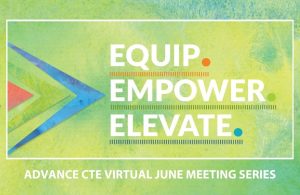 On June 15, Advance CTE held the second of three events in our Virtual June Meeting Series. The series offers three opportunities to equip Career Technical Education (CTE) leaders with the latest research and innovations, empower them to succeed, and elevate their work to raise awareness of the value of CTE.
On June 15, Advance CTE held the second of three events in our Virtual June Meeting Series. The series offers three opportunities to equip Career Technical Education (CTE) leaders with the latest research and innovations, empower them to succeed, and elevate their work to raise awareness of the value of CTE. 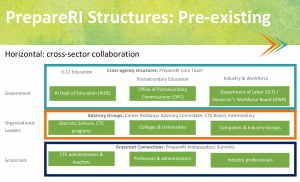
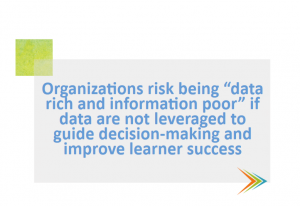 Peter Plourde
Peter Plourde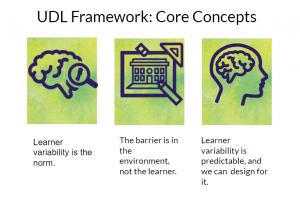
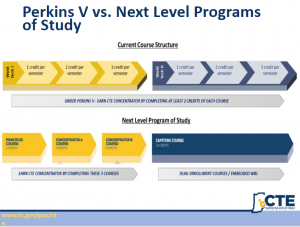
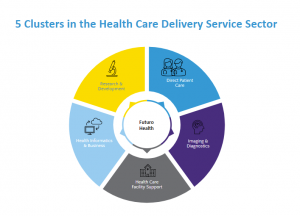
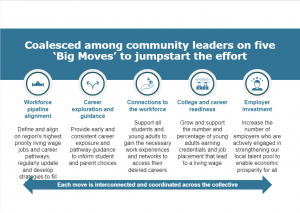 Dallas Foundation Chief Impact Officer Drexell Owusu was candid about the equity and quality of life challenges facing residents of Dallas. However, he was equally optimistic about the role that CTE can have in providing high-quality pathways to maximize recent economic growth and increase the number of young adults achieving a living wage to 50 percent within one generation. He identified five strategies that comprise the Dallas Thrives initiative to achieve this goal.
Dallas Foundation Chief Impact Officer Drexell Owusu was candid about the equity and quality of life challenges facing residents of Dallas. However, he was equally optimistic about the role that CTE can have in providing high-quality pathways to maximize recent economic growth and increase the number of young adults achieving a living wage to 50 percent within one generation. He identified five strategies that comprise the Dallas Thrives initiative to achieve this goal. 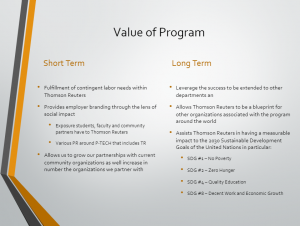 Thomson Reuters Director of Community Relations
Thomson Reuters Director of Community Relations 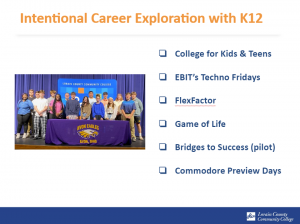 Lorain County Community College Manager of Career Technical Pathways & Programs
Lorain County Community College Manager of Career Technical Pathways & Programs  Despite being virtual throughout 2021 due to the ongoing pandemic, Advance CTE endeavored to create inclusive and engaging spaces for our members. All told,
Despite being virtual throughout 2021 due to the ongoing pandemic, Advance CTE endeavored to create inclusive and engaging spaces for our members. All told, 

